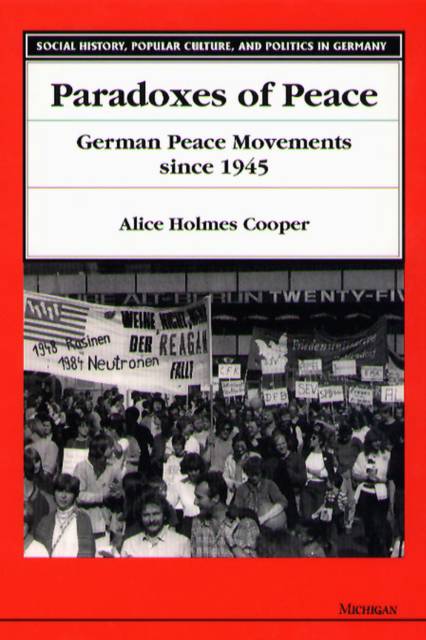
Nos liseuses Vivlio rencontrent actuellement des problèmes de synchronisation. Nous faisons tout notre possible pour résoudre ce problème le plus rapidement possible. Toutes nos excuses pour la gêne occasionnée !
- Retrait gratuit dans votre magasin Club
- 7.000.000 titres dans notre catalogue
- Payer en toute sécurité
- Toujours un magasin près de chez vous
Nos liseuses Vivlio rencontrent actuellement des problèmes de synchronisation. Nous faisons tout notre possible pour résoudre ce problème le plus rapidement possible. Toutes nos excuses pour la gêne occasionnée !
- Retrait gratuit dans votre magasin Club
- 7.000.0000 titres dans notre catalogue
- Payer en toute sécurité
- Toujours un magasin près de chez vous
Description
Given the militarism of the Empire and Nazi Germany, why did postwar West Germany experience massive waves of peace protest in the 1950s, 1960s, and 1980s? How have postwar peace movements shaped German political culture? Will the cultural norms that frown on the use of military force constrain foreign policy in the new, unified, Germany? In Paradoxes of Peace, Alice Holmes Cooper traces the evolution of peace movements in West Germany (1945-90) and in united Germany since 1990. Cooper examines the domestic and international constellations that gave rise to the peace movements, the sources of their multi-faceted ideologies and participants, and their organizational structures and strategies. The author then investigates the peace movement's response to the challenges of the post-Cold War world.
Whereas previous work on German peace movements has concentrated on one period of mobilization or on elite security-policy debates, this comprehensive study examines all phases of mobilization since 1945, taking into account the full spectrum of actors, movement organization and strategy, and the broad political, social, and economic environments spawning peace protest. Arguing that theories of resource mobilization, changes in values, and crises of modernity are insufficient to explain peace movements, Paradoxes of Peace tailors a "political process" approach to postwar German movements. It investigates the political opportunities--the changing domestic and international constellation--which most favored peace mobilization since 1945. It examines the process through which the peace movement transformed popular consciousness and created a peace constituency. It analyzes how German peace movements gradually built an indispensable organizational infrastructure autonomous from parties and other social institutions. Cooper argues that the convergence of these factors determined the movement's capacity to mobilize and have political impact and allowed these to grow over time.
Alice Holmes Cooper is Assistant Professor of Government, University of Virginia.
Whereas previous work on German peace movements has concentrated on one period of mobilization or on elite security-policy debates, this comprehensive study examines all phases of mobilization since 1945, taking into account the full spectrum of actors, movement organization and strategy, and the broad political, social, and economic environments spawning peace protest. Arguing that theories of resource mobilization, changes in values, and crises of modernity are insufficient to explain peace movements, Paradoxes of Peace tailors a "political process" approach to postwar German movements. It investigates the political opportunities--the changing domestic and international constellation--which most favored peace mobilization since 1945. It examines the process through which the peace movement transformed popular consciousness and created a peace constituency. It analyzes how German peace movements gradually built an indispensable organizational infrastructure autonomous from parties and other social institutions. Cooper argues that the convergence of these factors determined the movement's capacity to mobilize and have political impact and allowed these to grow over time.
Alice Holmes Cooper is Assistant Professor of Government, University of Virginia.
Spécifications
Parties prenantes
- Auteur(s) :
- Editeur:
Contenu
- Nombre de pages :
- 344
- Langue:
- Anglais
- Collection :
Caractéristiques
- EAN:
- 9780472106240
- Date de parution :
- 12-01-96
- Format:
- Livre relié
- Format numérique:
- Genaaid
- Dimensions :
- 160 mm x 235 mm
- Poids :
- 639 g







